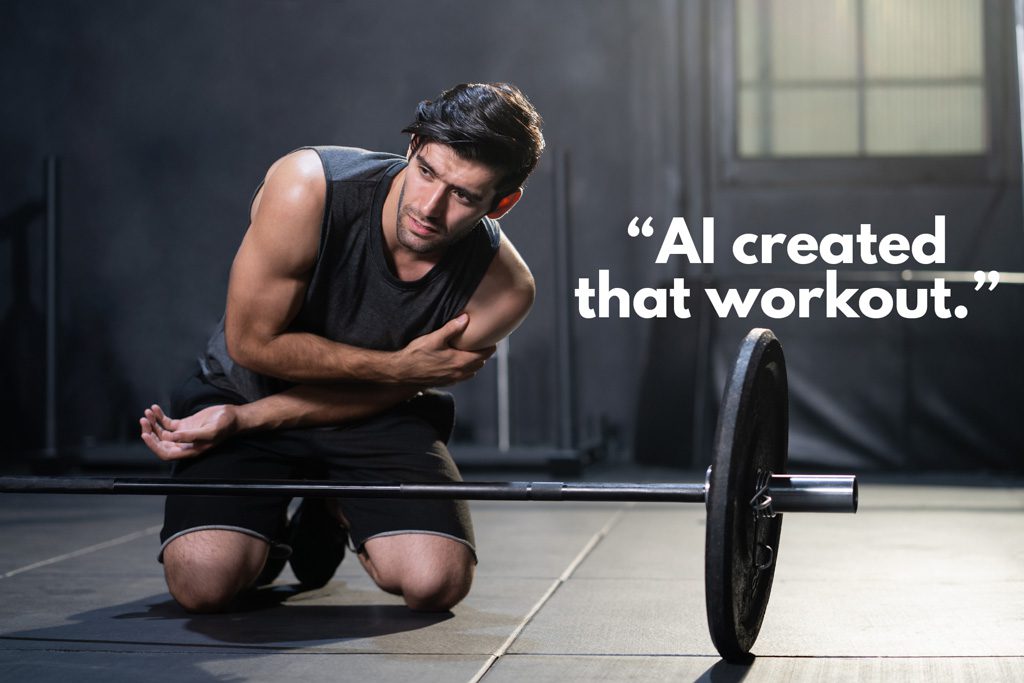You use AI at your gym, right?
We all do.
It’s great for idea generation, clean-up, busy work and systemization.
But it’s not a risk-free reference bible or a replacement for your expertise as a coach.
To ensure you’re using AI the right way, I had Matthew Becker of Gym Lawyers PLLC lay out the risks.
Becker, the former owner of Industrial Athletics in Pittsburgh, pointed out three main areas of concern:
1. Going outside your scope of practice.
2. Accidentally increasing legal exposure.
3. Losing the ability to pass off liability.
Let’s dig in.
1. Working Outside Scope of Practice
AI knows all, so it’s very tempting to use it to solve problems and get answers. But if you start working outside your scope of practice as a qualified fitness pro, you can get into trouble.
For example, you should not use AI to assess injuries and create rehab programs if you are not a licensed therapist.
You can run into similar issues when it comes to nutrition, medicine and so on. AI is a great resource, but be very careful what you do with the info you acquire.
“It’s fine using it to educate myself, … but the moment that I start holding myself out as the person who can help you fix your ruptured disc, now I’ve exceeded my scope of practice and we’ve got a problem,” Becker said.
In short, scope of practice for fitness coaches remains the same as it was before AI appeared:
Do not do things you are not qualified or licensed to do (even if AI makes it very easy to overstep these boundaries).
2. Increasing Legal Exposure
AI’s unending flood of instant info can increase your risk even if you are working within your scope of practice.
In simple terms, the more “expert info” you use from AI, the more liability you take on if something goes wrong. Even if you stay within your scope, increasingly detailed advice could make you more vulnerable to negligence claims.
In the past, a client might ask a question past the edge of your knowledge as a coach. Example: “What percentage of my max should I use for accommodating resistance as part of a Westside Barbell-fueled focus on my back squat?”
You could say “I don’t know” or refer that client to an experienced powerlifting coach who has the answer. Or you could dig in, do some research yourself, get the right answer after careful evaluation, and frame your answer with your detailed knowledge of the client’s training history and goals.
With AI, you can literally find the answer for the client during a fake bathroom break and spout it off casually when you return. That insta-fix makes you looks smart but increases your legal exposure.
And that leads to the third issue.
3. Losing the Ability to Pass off Liability
If you rely on AI instead of licensed professionals, you can’t shift responsibility when something goes wrong. It will all fall on you.
For example, a waiver written by AI and later invalidated in court leaves you fully liable. If an attorney wrote it, malpractice insurance would cover you.
Same deal in your personal life: The government won’t hold ChatGPT responsible if you used it to file a completely flawed tax return. You will get the blame and the bill.
Don’t ever think “AI told me to do it” will get you out of trouble if something goes wrong in your gym.

Other Concerns
Becker also laid out a few specific scenarios that can create problems:
- AI-generated waivers or contracts can be full of errors and may not comply with local laws.
- Insurers may deny claims if your AI-generated documents are flawed.
- Uploading medical data, injury info or credit-card details into AI systems creates the potential for HIPAA violations or privacy breaches.
- Anything generated by AI isn’t truly “yours”—it can’t be copyrighted—and it might even infringe on others’ intellectual property (e.g., images or content).
Safe and Smart Uses of AI
Don’t misunderstand: Matthew isn’t saying, “Don’t use AI.” He’s just pointing out areas where it can get you into trouble.
It can be very helpful in many ways. Such as:
Education and research—AI is great for learning more about a topic. Example: “Review the available research and give me the top five exercises for glute activation.” You can then apply what you learn within your scope of practice.
Content creation—Use AI to brainstorm ad copy, newsletter ideas or blog structures. Always review outputs for accuracy and tailor content to your business and audience.
Ops work at high speed—AI is great for document formatting, organization and systemization. For example, you could dictate your SOP for cleaning the gym into your phone and have AI produce a polished page for your staff playbook in seconds.
Efficiency in working with professionals—AI can help outline agreements or ideas before your speak to an expert, such as an attorney or CPA. You’ll have the lay of the land before your meeting, which saves time and money while keeping legal protections intact.
Phrasing and communications—Have a tough conversation coming up with a client? Why not role-play with AI to work on calm, clear communication in an emotionally charged situation. I’m not saying “parrot the bots”; be yourself, but go into your meeting prepared.
Used wisely, AI is an incredibly powerful tool.
“‘Hey, Chat, can you give me some ideas here?’ And then you take that information, that education, and you turn around and you fit it in with your scope of practice, and you become a better business owner or a better trainer,” Becker explained.
“And there’s nothing wrong with doing that as long as you’re staying in your scope of practice, as long as you know that you’re increasing your exposure, and as long as you’re not absorbing liability that you could push off onto other professionals.”
Key Guidelines
Here’s a list that will help you use AI wisely as a gym owner:
- Stay within your professional scope of practice.
- Trust but verify: Review everything AI produces before using it.
- Don’t substitute AI for professionals (lawyers, CPAs, care providers, business mentors).
- Protect sensitive data (avoid putting confidential info into AI).
- Beware of IP risks (AI-generated material might infringe on others’ rights).
We teach gym owners exactly how to use AI in their businesses. To hear more about that, book a call to talk about mentorship.

